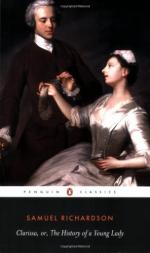|
This section contains 7,499 words (approx. 25 pages at 300 words per page) |

|
SOURCE: “Irony, Storytelling, and the Conflict of Interpretation in Clarissa,” in ELH, Vol. 53, No. 4, Winter 1986, pp. 759-77
In the following essay, Wehr argues that deconstructionist interpretations of Samuel Richardson's Clarissa miss the ways the author uses irony to impose a single, moralizing narrative judgment on the story's characters and actions.
In recent years dour, didactic Samuel Richardson has become a proving ground for deconstructionist criticism. The epistolary mode, in which different characters read experience according to their irreconcilable value systems, interests and desires, and the author withdraws behind an editor's mask, appears to thematize “the struggles of interpretation,” making Clarissa a tragedy of “hermeneutic anarchy … a cacophony of voices, a multiplicity of exegetes struggling to articulate different ‘constructions’ of the world.”1 This hermeneutical struggle constitutes a power struggle: Lovelace reads Clarissa so as to inscribe her into his system while she resists the “rape” of such “colonization.”2
Though...
|
This section contains 7,499 words (approx. 25 pages at 300 words per page) |

|


